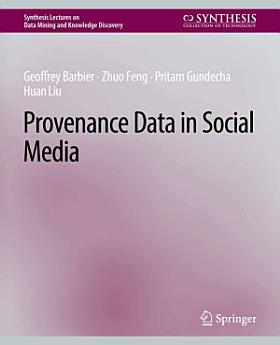Provenance Data in Social Media
Mei 2022 · Springer Nature
Kitabu pepe
72
Kurasa
reportUkadiriaji na maoni hayajahakikishwa Pata Maelezo Zaidi
Kuhusu kitabu pepe hiki
Social media shatters the barrier to communicate anytime anywhere for people of all walks of life. The publicly available, virtually free information in social media poses a new challenge to consumers who have to discern whether a piece of information published in social media is reliable. For example, it can be difficult to understand the motivations behind a statement passed from one user to another, without knowing the person who originated the message. Additionally, false information can be propagated through social media, resulting in embarrassment or irreversible damages. Provenance data associated with a social media statement can help dispel rumors, clarify opinions, and confirm facts. However, provenance data about social media statements is not readily available to users today. Currently, providing this data to users requires changing the social media infrastructure or offering subscription services. Taking advantage of social media features, research in this nascent field spearheads the search for a way to provide provenance data to social media users, thus leveraging social media itself by mining it for the provenance data. Searching for provenance data reveals an interesting problem space requiring the development and application of new metrics in order to provide meaningful provenance data to social media users. This lecture reviews the current research on information provenance, explores exciting research opportunities to address pressing needs, and shows how data mining can enable a social media user to make informed judgements about statements published in social media. Table of Contents: Information Provenance in Social Media / Provenance Attributes / Provenance via Network Information / Provenance Data
Kuhusu mwandishi
Geoffrey Barbier earned his Ph.D. in Computer Science at Arizona State University in Dec 2011. He was a student in the Data Mining and Machine Learning (DMML) Laboratory. He is a 2009 Science, Math, and Research for Transformation (SMART) scholarship recipient. His research interests include social computing, applying data mining and machine learning to social media data, and leveraging crowdsourced data to improve Humanitarian Aid and Disaster Relief (HADR) efforts. He earned a bachelor's degree in computer science at Brigham Young University, Provo, Utah. Geoff also completed a master's degree in business administration through Webster University. He is currently employed as a senior computer scientist at the Air Force Research Laboratory. Any views expressed in this work are the author's personal views and not necessarily those of the Department of Defense or Federal Government. Zhuo Feng is a post-doc researcher at the Data Mining and Machine Learning (DMML) Laboratory of ComputerScience and Engineering, Arizona State University (ASU). He obtained his Ph.D. in the Department of Systems and Industrial Engineering at the University of Arizona. His research interests include social computing, data mining, optimization, and machine learning. His recent research focuses on information diffusion and provenance issues in social media. Pritam Gundecha is a computer science Ph.D. student at Arizona State University (ASU). He also works as a graduate research assistant at the Data Mining and Machine Learning (DMML) Laboratory of Computer Science and Engineering at ASU. His research interests include social computing, data mining, and machine learning. His research focuses on security, privacy, and trust issues in social media. He earned a master's degree in computer science at ASU in 2010. He was interviewed by ReadWriteWeb, New Scientist, and Toronto Star for his recent work that was mentioned at more than a dozen media sites. Huan Liu is a professor of computer scienceand engineering at Arizona State University (ASU). He received his Ph.D. from University of Southern California and Bachelor of Engineering from Shanghai Jiao Tong University. He has been recognized for excellence in teaching and research in the Departement of Computer Science and Engineering at ASU. His research interests include data/web mining, machine learning, social computing, and artificial intelligence, investigating problems that arise in many real-world applications with high-dimensional data of disparate forms and multiple sources such as feature selection, modeling group interaction, relational learning, text categorization, biomarker identification, and social media analysis. His well-cited publications include books, book chapters, encyclopedia entries, conference and journal papers. He serves on journal editorial boards and numerous conference program committees, and he is a founding organizer of the International Workshop/Conference Series on Social Computing, Behavioral Modeling, and Prediction (SBP).
Kadiria kitabu pepe hiki
Tupe maoni yako.
Kusoma maelezo
Simu mahiri na kompyuta vibao
Sakinisha programu ya Vitabu vya Google Play kwa ajili ya Android na iPad au iPhone. Itasawazishwa kiotomatiki kwenye akaunti yako na kukuruhusu usome vitabu mtandaoni au nje ya mtandao popote ulipo.
Kompyuta za kupakata na kompyuta
Unaweza kusikiliza vitabu vilivyonunuliwa kwenye Google Play wakati unatumia kivinjari cha kompyuta yako.
Visomaji pepe na vifaa vingine
Ili usome kwenye vifaa vya wino pepe kama vile visomaji vya vitabu pepe vya Kobo, utahitaji kupakua faili kisha ulihamishie kwenye kifaa chako. Fuatilia maagizo ya kina ya Kituo cha Usaidizi ili uhamishe faili kwenye visomaji vya vitabu pepe vinavyotumika.







